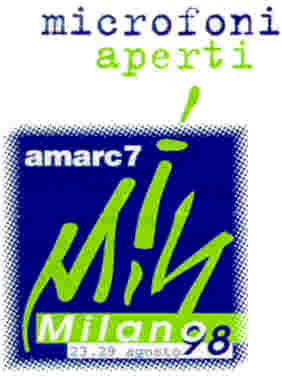amarc-3
[Date Prev][Date Next][Thread Prev][Thread Next][Date Index][Thread Index]
<amarc-3> QUESTIONS FOR DISCUSSION
HELLO, SALUT, HOLA
(THIS MESSAGE IS ONLY IN ENGLISH AT THE POINT)
Thanks to Jose Ignacio Lopez Vigil for forwarding the declaration from the
Venezuala seminar on communications as human rights. To all list members:
please feel free to send or refer anything you feel is relevant to the list.
Aside from reference documents, I would like to encourage you to reflect
and send your comments on the proposed declaration. After a brief
introduction, I have outlined some issues for discussion. Let’s get going…
Developing the Milan Declaration:
With the premise that standards and norms for communication rights need to
be developed and reinforced at the national, Community and international
levels as an underpinning framework for regulatory approaches in all three
sectors, the Milan Declaration on Communication and Human Rights will
become a point of departure for setting international standards from the
perspective of community media. At the same time, it acknowledges that
implementation will be based on specific regional and local contexts.
Building on already existing documents and legislation, it will attempt to
address the issues at stake for community media in the current world context:
QUESTIONS FOR DISCUSSION
1. How can we ensure that civil society’s interests are considered in the
current technological environment?
2. How can cultural and social issues gain a more prominent place in the
debate over technological convergence (telecommunications, computing,
broadcasting)?
3. The development of new digital broadcast systems is leading to
re-planning existing frequency allocation and new approaches to regulation
- how can we ensure community broadcasters have a say in the changes?
4. Specifically, when regulating the media environment, how can we ensure
that a space is reserved for communication services run by and for
citizens, communities and social organizations, and not solely based on the
interests of government and industry?
5. And, how can we ensure universal access to new communications
technologies to avoid the creation of a two tier system of "haves" and
"have-nots"? (universal access - the social and economic argument and its
implications)
6. How can regulation be influenced so that smaller independent and
community broadcasters survive the clutches of larger media companies whose
concentration of ownership increasingly threatens plurality?
7. How can community media strengthen cultural rights, in particular, for
minorities, aliens, indigenous peoples, and migrants? (through
legislative, administrative, and financial measures)
8. How can we ensure that the diversity of the world’s cultures and
languages are sustained?
9. How do we ensure that the market economy is not the only model for the
shaping the communications infrastructure; under this model people are
defined solely as "consumers" of information, how can we ensure people are
seen as producers and contributors?
Elvira Truglia
Editor, InteRadio
World Association of Community Radio Broadcasters
Association Mondiale des Radiodiffuseurs Communautaires
Asociacion Mundial de Radios Comunitarias
International Secretariat
3575 Saint-Laurent Blvd. #611
Montréal, Québec H2X 2T7 CANADA
Tel : +1 (514) 982 03 51 Fax : +1 (514) 849 71 29
Email: [email protected]
WWW : http://www.amarc.org
++++++++++++++++++++++++++++++++++
AMARC 7 Foro Virtual Forum Virtuel
http://www.amarc.org/amarc7
to unsubscribe / pour se desabonner / para abandonar :
e-mail "unsubscribe amarc-3 " to: [email protected]
Tecnical realisation, scripting and archiving: Worldcom
Foundation
English: [Virtual
Forum Index] [Search
Forum archives]
Français: [Index
du Forum Virtuel] [Chercher
dans les archives du Forum]
Español: [Índice
del Foro Virtual] [Buscar
en los archivos del Foro]
